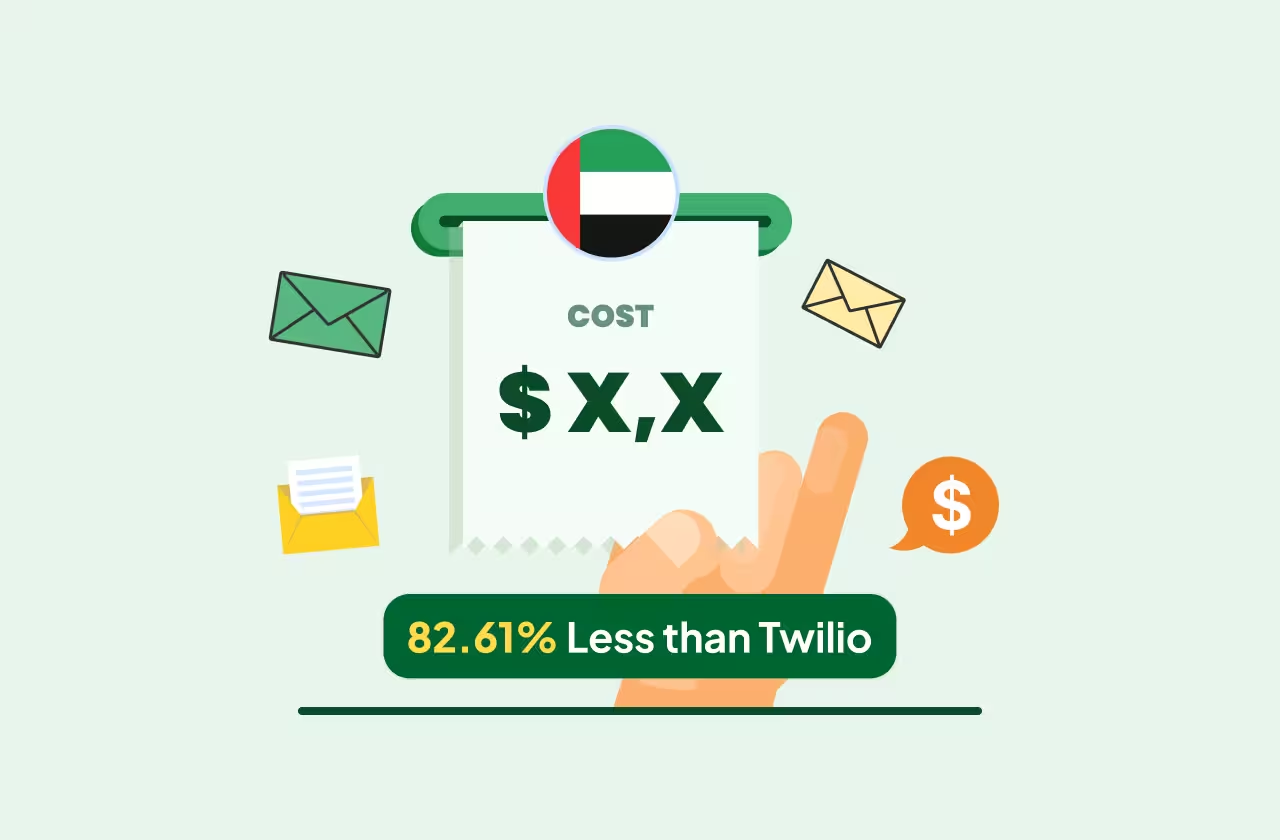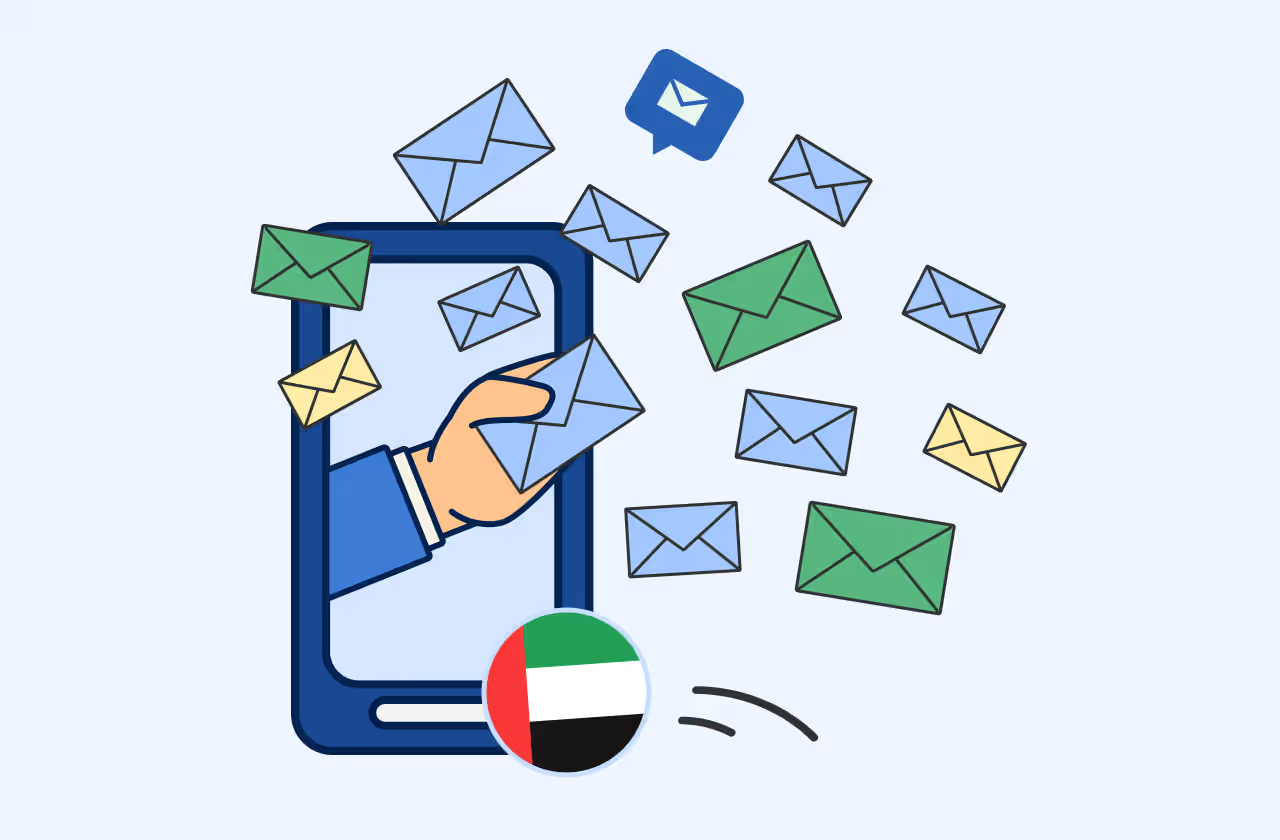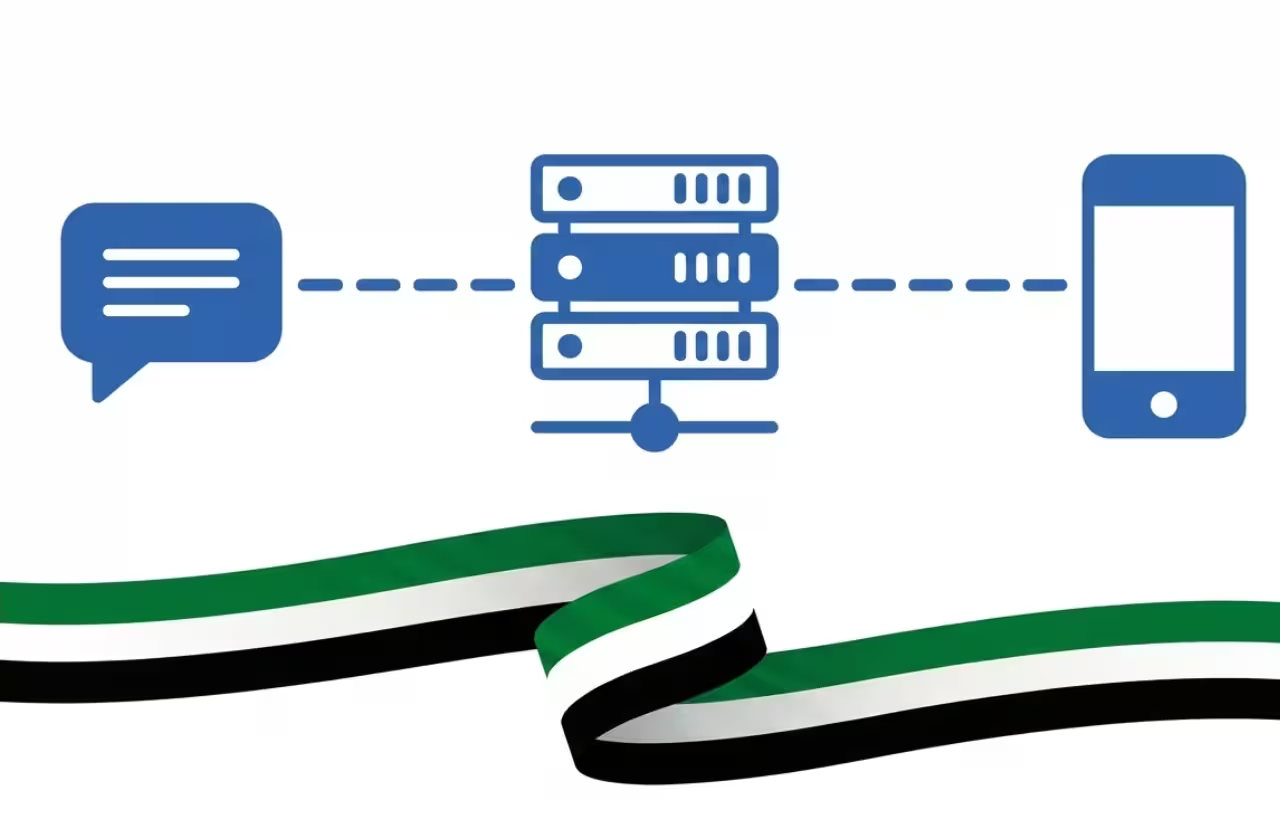Key Takeways
- SMS has become a ubiquitous communication tool because of its wider reach when compared to other channels of communication
- SMS marketing has multiple benefits including high open rates, increased response rates etc.
- SMS marketing campaigns can either be promotional or transactional
- Businesses use SMS marketing for sending welcome messages, announcing product releases, collecting customer feedback etc.
- For a successful campaign, one should track all campains and ensure proper regulations and compliance
A strategy that has gained significant popularity is SMS marketing. With nearly 6.57 billion people already using SMS, it presents a unique opportunity to connect with your customers and prospects directly on their mobile devices. In this comprehensive guide, we will explore the ins and outs of SMS marketing, including its benefits, types of campaigns, and best practices to help you leverage this powerful tool for your business.
There are not many channels as ubiquitous as SMS. According to Mobilesquared, here’s a quick overall view: -

What is an SMS Marketing?
Understanding SMS Marketing
SMS marketing, also known as text marketing, is a form of mobile marketing where businesses send text messages to their customers and prospects. These messages can range from promotional offers and discounts to appointment reminders and shipping notifications. With nearly 100% open rates, SMS marketing presents a highly effective channel to reach your target audience directly on their mobile devices.
Advantages of SMS Marketing
SMS marketing offers several advantages over other mobile marketing strategies, such as email marketing and push notifications. Here are some key benefits:
- High Open Rates: SMS messages have nearly 100% open rates, ensuring that your audience is more likely to see your message compared to email marketing.
- Timely and Relevant: SMS messages allow you to provide time-sensitive and relevant information to your customers, such as flash sales, limited-time offers, and event reminders.
- Direct and Personal: SMS marketing enables direct and personalized communication with your customers, helping to build a stronger connection and increase engagement.
- Increased Response Rates: Due to the direct nature of SMS messages, they have higher response rates compared to other marketing channels, making it easier to engage with your audience and drive conversions.
- Complements Other Channels: SMS marketing can be used in conjunction with other marketing channels, such as social media and email, to enhance your overall marketing strategy and reach a wider audience.
Types of SMS Marketing Campaigns
SMS marketing campaigns can be categorized into two main types: promotional campaigns and transactional campaigns.
Promotional Campaigns
Promotional SMS marketing campaigns are designed to generate interest in a product or service. These campaigns often include discounts, coupons, and other special offers to entice customers to make a purchase. Promotional campaigns can be an excellent way to drive traffic to your store or website and increase sales. Here's an example of a promotional SMS campaign:

Transactional Campaigns
Transactional SMS marketing messages are sent in response to an event or action. These campaigns provide time-sensitive and relevant information to the customer, such as appointment reminders, OTP SMS, shipping notifications, or password resets. Transactional campaigns have high open rates and can be highly effective in driving conversions. Here's an example of a transactional SMS campaign:

It's important to note that while promotional campaigns require explicit opt-in from subscribers, transactional messages can be sent to customers who have an existing relationship with your business, such as previous purchasers or subscribers.
Why Businesses Use SMS Marketing
SMS marketing offers numerous benefits that make it a valuable tool for businesses across various industries. It can be leveraged with the help of an SMS API provider. Here are some key reasons why businesses choose to incorporate SMS marketing into their marketing strategies:
Reach customers faster
SMS messages have an incredibly high open rate, with 90% of text messages being opened within three minutes of receipt. This makes SMS marketing an ideal channel for time-sensitive information, such as limited-time offers, flash sales, or event announcements.
Increase response rates
Compared to other marketing channels, SMS messages have higher response rates. The direct nature of SMS marketing allows you to engage with your customers on a more personal level, making it easier to encourage them to take action, such as making a purchase or attending an event.
Complement other marketing channels
SMS marketing can be used in conjunction with other marketing channels to enhance your overall marketing strategy. For example, you can use SMS to promote a contest or sale on social media, include a link to an email newsletter in your text messages, or remind customers of an upcoming event or webinar.
Build customer loyalty
SMS marketing enables you to send personalized messages and offers to your customers, making them feel valued and appreciated. By providing exclusive discounts, early access to sales, and other benefits, you can foster customer loyalty and increase the likelihood of repeat purchases.
Increase revenue
SMS marketing can drive traffic to your store or website, resulting in increased revenue. By promoting special sales and events through SMS messages and including a clear call to action, you can encourage customers to take advantage of your offers and make a purchase. Additionally, you can use SMS messages to remind customers about items they've left in their shopping cart, helping to recover potential lost sales.
SMS Marketing Strategies and Examples
To make the most of SMS marketing, it's important to develop effective strategies tailored to your business goals. Here are some SMS marketing strategies and examples to inspire your campaigns:
Send welcome messages to new subscribers
When a customer subscribes to your SMS marketing campaign, send them a welcome message to confirm their subscription and engage with them right away. Consider including a coupon code or special offer to make them feel welcomed and incentivize their continued engagement.
Announce new product releases
Use SMS marketing to announce new product releases to your subscribers. By notifying them as soon as (or before) a new product is available, you can generate excitement and interest. Include a link to your website or online store to drive traffic and encourage purchases.
Follow up on abandoned shopping carts
Recover potential lost revenue by sending SMS messages to customers who have abandoned their shopping carts. Remind them of the items they left behind and include a clear call to action to complete their purchase. Consider offering an exclusive discount or free shipping to incentivize them to return and complete their transaction.
Inform customers when products are back in stock
Notify your customers as soon as products they're interested in are back in stock. This helps create a sense of urgency and encourages them to make a purchase before the items sell out again. Consider offering a special discount for customers who purchase products that were previously out of stock.
Collect customer feedback
Gather valuable customer feedback through SMS surveys. You can use tools like Google Forms or SurveyMonkey to create short surveys and send the survey link via SMS. Alternatively, ask customers to reply to your text with a rating or feedback. This feedback can help you improve your products and services and build stronger customer relationships.
Provide text-based customer service
Offer text-based customer service through SMS messages. This is particularly useful for businesses with a mobile workforce, such as plumbers or delivery drivers. Customers can simply send a text to get in touch, saving them time and providing a convenient communication channel. Customer onboarding can also be made seamless with OTP SMS.
Ask for product or service reviews
Request customer reviews to gather feedback and build trust with potential customers. Prompt customers to rate their experience and provide a review. Consider displaying these reviews on your website or social media pages to showcase the positive experiences of your customers.
Promote online and in-person events
Use SMS marketing to promote your upcoming events and increase attendance. Include key details such as the date, time, and location of the event, along with a clear call to action to sign up or purchase tickets. You can also encourage attendees to share the event on social media using specific hashtags.
Start a VIP program
Reward your loyal customers by offering them exclusive benefits through a VIP program. Use SMS marketing to invite customers to join the program and provide them with early access to sales, special discounts, and personalized offers. Segment your SMS list to send tailored messages to your VIP customers, making them feel valued and appreciated.
By implementing these SMS marketing strategies, you can effectively engage with your audience, drive conversions, and build stronger customer relationships.
Seamless onboarding
With an OTP SMS provider, use can not only ensure seamless onboarding but also authenticate users within 5 seconds using an OTP SMS. To enable the same, have a quick read on how to pick the best OTP SMS provider.
Best Practices for SMS Marketing
To ensure the success of your SMS marketing campaigns, it's important to follow best practices. Here are some key guidelines to keep in mind:
Obtain explicit opt-in from subscribers
Only send SMS messages to customers who have explicitly given you permission to do so. Include an opt-in form on your website or other online channels and consider sending an initial text to new subscribers to confirm their opt-in.
Make it easy to opt-out
Provide a clear and simple way for customers to opt-out of receiving SMS messages from you. Include an unsubscribe option in every message and honor all unsubscribe requests promptly.
Personalize your messages
Tailor your SMS messages to the recipient by including their name or other relevant personal information. Personalization can significantly increase engagement and make your customers feel valued.
Keep messages short and concise
SMS messages have a limited character count, so it's important to keep your messages short, clear, and to the point. Focus on conveying the most important information and include a clear call to action.
Test visuals and multimedia
Consider incorporating visuals, such as images or GIFs, into your SMS messages to increase engagement. Visuals are particularly effective for ecommerce brands looking to showcase specific products or drive sales.
Segment your audience
Segment your SMS list based on customer preferences, purchase history, or other relevant data. This allows you to send more targeted and personalized messages, resulting in higher engagement and conversion rates.
Determine optimal frequency
Find the right balance when it comes to the frequency of your SMS messages. Sending too many messages can lead to customer fatigue and increased opt-outs, while sending too few messages may result in decreased engagement. Test different frequencies to determine what works best for your audience.
By following these best practices, you can ensure that your SMS marketing campaigns are effective, engaging, and well-received by your audience.
SMS Marketing Regulations and Compliance
When implementing SMS marketing, it's essential to comply with relevant regulations and protect your customers' privacy. Here are some key considerations:
TCPA regulations
Familiarize yourself with the regulations set forth by the Telephone Consumer Protection Act (TCPA) in your country. The TCPA regulates the sending of marketing messages via SMS and requires businesses to obtain proper consent from recipients.
Obtaining proper consent
Ensure that you have obtained explicit opt-in consent from customers before sending them SMS messages. Implement a clear opt-in process, such as an online form or a keyword opt-in via text.
Opt-out and unsubscribe options
Provide an easy and clear way for customers to opt-out of receiving SMS messages from your business. Include an unsubscribe option in every message and promptly honor all opt-out requests.
Data protection and privacy
Protect your customers' data and ensure compliance with data protection laws. Implement appropriate security measures to safeguard customer information and only use their data for the intended purpose.
By adhering to these regulations and best practices, you can maintain a positive reputation, build trust with your customers, and mitigate any potential legal risks associated with SMS marketing.
Measuring Success and Tracking ROI
To gauge the success of your SMS marketing campaigns and track return on investment (ROI), it's important to establish key performance indicators (KPIs) and regularly analyze your campaign metrics. Here are some metrics to consider:
Key performance indicators (KPIs)
Identify the KPIs that align with your business goals. These may include open rates, click-through rates, conversion rates, revenue generated, customer engagement, and customer retention.
Tracking click-through rates
Monitor the click-through rates of the links included in your SMS messages. This indicates the level of customer engagement and can help you optimize your messages and calls to action.
Analyzing conversion rates
Analyze the conversion rates from your SMS marketing campaigns. This allows you to determine the effectiveness of your messages in driving desired actions, such as making a purchase or signing up for an event.
Monitoring customer engagement
Track customer engagement metrics, such as response rates, feedback, and survey responses. This provides insights into the level of customer satisfaction and helps you make data-driven decisions to improve your SMS marketing strategy.
By regularly measuring and analyzing these metrics, you can gain valuable insights into the success of your SMS marketing campaigns and make informed adjustments to optimize your results.
Conclusion: Capitalize on the Power of SMS Marketing
SMS marketing presents a powerful and effective strategy to reach your target audience, engage with customers, and drive conversions. By understanding the benefits, implementing best practices, and leveraging innovative strategies, you can harness the full potential of SMS marketing for your business. Remember to choose a reliable SMS marketing platform, comply with regulations, measure your success, and continuously optimize your campaigns to achieve your marketing goals. Embrace the power of SMS marketing and take your business to new heights of success.










.avif)